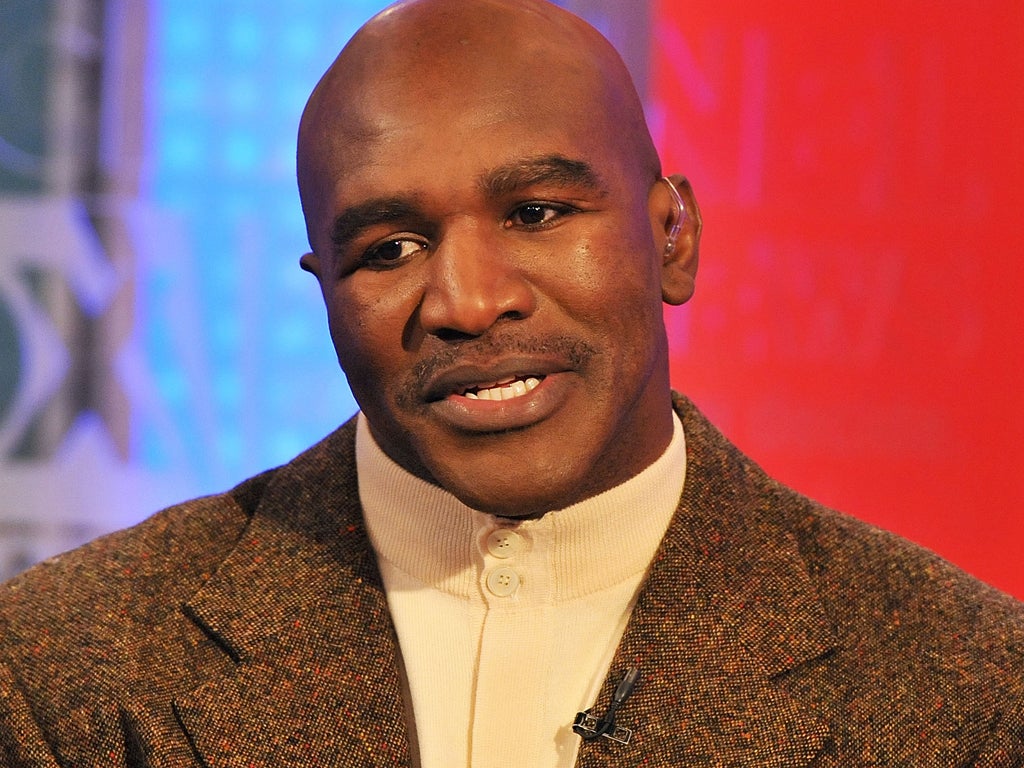Don't judge all Christians by Evander Holyfield's homophobic comments
If you’re going to live your life according to the teachings of a book, you should at least study it in an objective way


Your support helps us to tell the story
From reproductive rights to climate change to Big Tech, The Independent is on the ground when the story is developing. Whether it's investigating the financials of Elon Musk's pro-Trump PAC or producing our latest documentary, 'The A Word', which shines a light on the American women fighting for reproductive rights, we know how important it is to parse out the facts from the messaging.
At such a critical moment in US history, we need reporters on the ground. Your donation allows us to keep sending journalists to speak to both sides of the story.
The Independent is trusted by Americans across the entire political spectrum. And unlike many other quality news outlets, we choose not to lock Americans out of our reporting and analysis with paywalls. We believe quality journalism should be available to everyone, paid for by those who can afford it.
Your support makes all the difference.Yesterday, a mass Twitter-furore was caused after former heavyweight boxing champion and sporting icon Evander Holyfield made homophobic remarks on camera in the Celebrity Big Brother House.
He espoused the view that being gay “ain't normal” and claimed that sexuality can be “fixed” in the same way you would “fix” a broken leg. When questioned, he used the sophisticated repost – “it says it in the Bible”.
Technically, he is right of course - it does say that being gay is wrong in the Bible, although interestingly not in any of the four main Gospels. Incidentally, the book also expresses similar sentiments about getting a tattoo (just a few pages later in Corinthians 6:19-20), of which Holyfield has several. In fact, there are many things “it says” in the Bible which we have consented to overlook as a society.
For some reason, the Biblical references to homosexuality appear to be the last bastion of wilful ignorance amongst some Christians. It would be easy to delude ourselves that Holyfield is a one-off, indeed during a subsequent ticking-off by Big Brother Evander was told that his views did not represent those of the majority and for that reason could cause offence. However, a phone-in radio show I listened to afterwards on the topic revealed some UK residents coming out in support of Holyfield’s viewpoint - all citing the Bible as their reasoning.
Whilst of course I am concerned about any negative impact on gay people arising out of these kinds of public statements, I actually found myself more sympathetic towards all the Christians I know who are intelligent enough not to uphold this stance. In an increasingly secular society, the impact of homosexual people dismissing all Christians as religious zealots is perhaps as damaging as the impact of a small but vocal section of the Christian community condemning homosexuality.
Personally, I am not religious in any sense, but I studied the New Testament in quite a lot of depth at college as half of my Religious Studies A Level, because I wanted to understand where Christians were coming from. That was a frighteningly long time ago and I’ve continued to have an interest in Christian Theology, and in particular the historical Jesus (who was, in my opinion, an absolute dude) ever since.
As the only agnostic in a class of 20 or so life-long Christians I expected to encounter a lot of bigotry because I had seen and heard the 90s equivalents of the Holyfield exchange in the media. I thought extreme views like that were a representation of the Christian faith. But I discovered my classmates understood that all passages in the Bible have a historical context and a personal bias determined by the writer, and that they had been endlessly translated (academics often argue about the Greek word that has been translated as ‘homosexuality’ – some say it should have been ‘prostitution’). They knew discretion was needed in many instances and that above all they had to uphold the central and unquestionable themes of the text – tolerance and resisting the temptation to judge others.
When it comes to homosexuality, I learned that Jesus, as far as we know, never touched on the subject. The most often-quoted anti-gay passage in the New Testament (“The sexually immoral …..idolaters nor adulterers nor men who have sex with men……. will inherit the kingdom of God”) actually come from St Paul’s letter to the Corinthians, in which he is, in my understanding, addressing the very specific problem of the townsfolk using Church as a way to meet other townsfolk for sexual shenanigans.
So my teenage classmates knew that it is perfectly possible to be a Christian and not to denounce homosexuality, and in fact, that it is perfectly possible to be a Christian and gay. Under Jesus’ teachings about forbearance an open minded and non-judgmental stance towards others is pretty-much mandatory. They knew that because they had taken the trouble to study it in the most objective way they could, which if you’re going to live your life according to the teachings of a book, it is probably shrewd to do.
Mr Holyfield and his ilk are less representative of the faith they claim to belong to, but for some reason homophobia and a tendency to want to spout-off in a public forum tend to go hand-in-hand. In order to promote a harmonious society we must not only make it clear that Mr Holyfield’s comments were unacceptable, but also give the Thinking Christian a louder voice.
Join our commenting forum
Join thought-provoking conversations, follow other Independent readers and see their replies
Comments